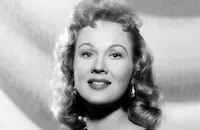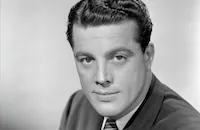Seven Days Ashore

Brief Synopsis
Cast & Crew
John H. Auer
Wally Brown
Alan Carney
Marcy Mcguire
Dooley Wilson
Gordon Oliver
Film Details
Technical Specs

Synopsis
Carol Dean and Lucy Banning, violinists in Dot Diamond's all-girl orchestra, both believe that they are engaged to wealthy playboy Dan Arland. Meanwhile, Dan, who has been at sea in the Merchant Marine for seven months, learns that his ship is heading for his home town of San Francisco, where he will be granted a seven-day leave. Dan writes a letter to each woman, asking her to meet him at the docks, and then puts both letters in a hat. After drawing Lucy's name from the hat, he throws out the letter addressed to Carol. The captain of Dan's ship finds Carol's letter on the deck and, thinking that he is doing the seaman a favor, mails it to her. When Dan and shipmates Monty Stephens and Orval Martin dock in San Francisco, Lucy runs to greet Dan, and as she embraces him, he sees Carol waving. Feigning pain from an old war wound, Dan asks Monty to take Lucy to the Indigo Club where her band performs. Just as he is about to greet Carol, Dan sees his parents and his former girl friend, debutante Annabelle Rogers, coming to meet him. Feigning pain once again, Dan sends Carol to the club with Orval. Annabelle is staying at the Arland house, and Mrs. Arland hopes that she and Dan will reconcile. That night, Dan is stuck at a boring welcome home party organized by his mother and sends a message to Dot to rescue him. Soon after, Dot, Lucy, Carol and the rest of the band visit the Arland home and enliven the party with their nightclub act. Lucy retires to the powder room to freshen her makeup and there opens Carol's purse to borrow some lipstick. When she discovers Dan's letter in the purse, Lucy confronts Carol and then presents her own letter. After comparing letters, the two women decide to teach Dan a lesson and confront him in front of Annabelle who then jealously announces that she is going to leave in the morning. The next morning, Dan awakens to breach-of-promise suits from both Lucy and Carol, and Annabelle decides to stay and relish his predicament. Deciding that the best way to avoid a lawsuit is to divert Carol and Lucy, Dan instructs Orval and Monty to pose as millionaires and romance the gold-digging violinists. Unknown to Dan, Annabelle has banded together with Lucy and Carol and has initiated the lawsuit to teach Dan a lesson. Orval and Monty begin to court Lucy and Carol, and one evening, the two women conclude a canoe ride by dumping their suitors into the lake. Having second thoughts, the women begin to help the imposters out of the water, and when Lucy and Carol also fall in the lake, the drenched foursome realize that they have fallen in love. Soon after, Dan proposes to Annabelle, but when she rejects his proposal because of the breach-of-promise suits, he tells her that he plans to call Lucy and Carol's bluff by proposing to them, knowing that they are really in love with Orval and Monty. Dan's plans go awry, however, when the two couples announce that they have just been married and Alfred Jones, Annabelle's fiancé, unexpectedly arrives at the house. After Jones reveals Annabelle's role in the lawsuit, Dan becomes angry, and Annabelle goes upstairs to pack her belongings. As she is packing, Annabelle hears Jason, the Arlands' servant, sing "Apple Blossoms in the Rain," the song that symbolized her romance with Dan, and she realizes that she is still in love with him. After Dan apologizes to Annabelle for his boorish behavior, they embrace and Jones storms out the door. With only seven hours of leave left, Dan and Annabelle rush to the justice-of-the peace to be wed, and afterward are welcomed home by a party featuring Dot and her band. As the band plays "Hail and Farewell," the Merchant Marines bid farewell to their brides and return to their ship.

Director
John H. Auer
Cast

Wally Brown
Alan Carney

Marcy Mcguire

Dooley Wilson

Gordon Oliver

Virginia Mayo
Amelita Ward
Elaine Shepard

Marjorie Gateson

Alan Dinehart
Miriam Lavelle

Margaret Dumont
Freddie Slack
Freddie Fisher
Corn Colonel And His Band
Emory Parnell

Ian Wolfe
Patti Brill

Elaine Riley
Daun Kennedy
Shirley O'hara
Elaine Anderson

Dorothy Maloney
Edgar Sherrod
Kernan Cripps
Tom Burton

Michael St. Angel
Jerry Shane
Roger Neury
Bill Dyer
Robert Schuler
Michael Road
Ruth Cherrington
Helen Dickson
Charles Cane
William Haade
Crew
John H. Auer
C. Bakaleinikoff
Mel Berns
Lucius O. Croxton
Albert S. D'agostino
Jacques Deval
Bailey Fesler
Freddie Fisher
Mort Greene
Lawrence Kimble
Harry Marker
Russell Metty
Charles O'curran
Irving Phillips
Lew Pollack
Renie
Gene Rose
Harry Scott
Darrell Silvera
William Stevens
James G. Stewart
Edward Verdier
Vernon L. Walker

Film Details
Technical Specs

Articles
Seven Days Ashore
Produced and directed by John Auer, with famed cinematographer Russell Metty behind the lens, Seven Days Ashore had more than a passing resemblance to Buck Privates with a playboy millionaire Dan Arland, Jr., (played by Gordon Oliver), two bumbling sidekicks (Brown and Carney) and a famous musician (Freddie Slack, with his orchestra). Instead of being set at training camp, as in Buck Privates, Seven Days Ashore has Merchant Marine rich boy Dan Arland coming into San Francisco for a week's shore leave, where he is met at the dock by both the women he's engaged to; Carol Dean (Virginia Mayo) and Lucy Banning (Amelita Ward), who just happen to be violinists in the same band. Also on the dock are his parents (Marjorie Gateson and Alan Dinehart, in one of his last roles) and his old girlfriend, Annabelle Rogers (Elaine Shepard), with whom his parents want him to reconcile. A comedy-of-errors ensues with the girls discovering that Arland is two-timing them and his subsequent attempts to get Carol and Lucy off his hands and into the arms of his buddies, Stephens and Martin.
While a harmless diversion, Seven Days Ashore was clearly a "B" picture and not a career-changer for anyone involved. Brown and Carney continued to make films together until 1946, when the team was broken up for good, and Virginia Mayo went on to stardom in her films with Danny Kaye.
By Lorraine LoBianco
Erickson, Hal. Military Comedy Films: A Critical Survey and Filmography of Hollywood Releases Since 1918
Fyne, Robert. The Hollywood Propaganda of World War II
The Internet Movie Database
"Seven Days Ashore", Montreal Gazette 5 Sept 44

Seven Days Ashore
Virginia Mayo (1920-2005)
She was born Virginia Clara Jones in St. Louis, Missouri on November 30, 1920, and got her show business start at the age of six by enrolling in her aunt's School of Dramatic Expression. While still in her teens, she joined the nightclub circuit, and after paying her dues for a few years traveling across the country, she eventually caught the eye of movie mogul Samuel Goldwyn. He gave her a small role in her first film, starring future husband, Michael O'Shea, in Jack London (1943). She then received minor billing as a "Goldwyn Girl," in the Danny Kaye farce, Up In Arms (1944). Almost immediately, Goldwyn saw her natural movement, comfort and ease in front of the camera, and in just her fourth film, she landed a plumb lead opposite Bob Hope in The Princess and the Pirate (1944). She proved a hit with moviegoers, and her next two films would be with her most frequent leading man, Danny Kaye: Wonder Man (1945), and The Kid from Brooklyn (1946). Both films were big hits, and the chemistry between Mayo and Kaye - the classy, reserved blonde beauty clashing with the hyperactive clown - was surprisingly successful.
Mayo did make a brief break from light comedy, and gave a good performance as Dana Andrews' unfaithful wife, Marie, in the popular post-war drama, The Best Years of Their Lives (1946); but despite the good reviews, she was back with Kaye in The Secret Life of Walter Mitty (1947), and A Song Is Born (1948).
It wasn't until the following year that Mayo got the chance to sink her teeth into a meaty role. That film, White Heat (1949), and her role, as Cody Jarrett's (James Cagney) sluttish, conniving wife, Verna, is memorable for the sheer ruthlessness of her performance. Remember, it was Verna who shot Cody¿s mother in the back, and yet when Cody confronts her after he escapes from prison to exact revenge for her death, Verna effectively places the blame on Big Ed (Steve Cochran):
Verna: I can't tell you Cody!
Cody: Tell me!
Verna: Ed...he shot her in the back!!!
Critics and fans purred over the newfound versatility, yet strangely, she never found a part as juicy as Verna again. Her next film, with Cagney, The West Point Story (1950), was a pleasant enough musical; but her role as Lady Wellesley in Captain Horatio Hornblower R.N. (1951), co-starring Gregory Peck, was merely decorative; that of a burlesque queen attempting to earn a university degree in the gormless comedy, She¿s Working Her Way Through College (1952); and worst of all, the Biblical bomb, The Silver Chalice (1954) which was, incidentally, Paul Newman's film debut, and is a film he still derides as the worst of his career.
Realizing that her future in movies was slowing down, she turned to the supper club circuit in the 60s with her husband, Michael O'Shea, touring the country in such productions as No, No Nanette, Barefoot in the Park, Hello Dolly, and Butterflies Are Free. Like most performers who had outdistanced their glory days with the film industry, Mayo turned to television for the next two decades, appearing in such shows as Night Gallery, Police Story, Murder She Wrote, and Remington Steele. She even earned a recurring role in the short-lived NBC soap opera, Santa Barbara (1984-85), playing an aging hoofer named "Peaches DeLight." Mayo was married to O'Shea from 1947 until his death in 1973. She is survived by their daughter, Mary Johnston; and three grandsons.
by Michael T. Toole
Virginia Mayo (1920-2005)
Quotes
Trivia
Notes
Although opening credits list Freddie Fisher and Colonel Corn separately, Fisher was known as Colonel Corn. According to an August 1943 news item in Hollywood Reporter, RKO originally planned this picture as a Navy musical starring Marcy McGuire. In September 1943, however, it was reformulated to star Alan Carney and Wally Brown as Merchant Marines. RKO shared Gordon Oliver's contract with David O. Selznick, according to a Hollywood Reporter news item.














